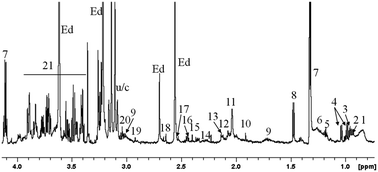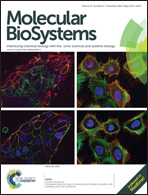Host metabolic responses to Plasmodium falciparum infections evaluated by 1H NMR metabolomics†
Abstract
The human malarial parasite Plasmodium falciparum causes the most severe forms of malarial infections, which include cerebral malaria and various organ dysfunctions amongst adults in India. So far no dependable clinical descriptor is available that can distinguish cerebral malaria from other symptomatically similar diseases such as sepsis and encephalitis. This study aims at evaluating the differential metabolic features of plasma samples from P. falciparum patients with varying severities, and patients suffering from symptomatically similar diseases. 1H Nuclear Magnetic Resonance (NMR) based metabolic profiling of the plasma of the infected individuals and the control population was performed. The differences in the plasma profiles were evaluated through multivariate statistical analyses. The results suggest malaria-specific elevation of plasma lipoproteins. Such an increase was absent in control populations. In addition, cerebral malaria patients exhibited a decrease in plasma glycoproteins; such a reduction was not observed in malarial patients without cerebral symptoms. The data presented here indicates that the metabolism and/or transport of the plasma lipids is specifically perturbed by malarial infections. The differential perturbation of the plasma glycoprotein levels in cerebral malaria patients may have important implications in the diagnosis of cerebral malaria.


 Please wait while we load your content...
Please wait while we load your content...